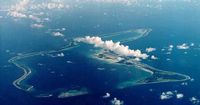In a stark escalation of military rhetoric, Iran has issued a warning that it would target a British-American naval base in the Indian Ocean if the United States were to attack. This pronouncement comes in the wake of the U.S. deploying long-range B-2 Spirit bombers to the Naval Support Facility Diego Garcia, located in the Chagos Islands. A spokesperson from the U.S. Strategic Command confirmed the deployment earlier this week, indicating a potential increase in military operations in the region.
A senior Iranian military official, speaking to The Telegraph, stated, "There will be no distinction in targeting British or American forces if Iran is attacked from any base in the region or within the range of Iranian missiles." This declaration underscores the growing tensions between Iran and the U.S., particularly in light of President Donald Trump's recent threats of military action against Tehran if it fails to negotiate a deal regarding its nuclear program.
On March 29, 2025, the Iranian official elaborated, saying, "When the time comes, it won’t matter whether you’re an American, British, or Turkish soldier – you will be targeted if your base is used by Americans." This warning highlights Iran's readiness to retaliate against any perceived aggression, emphasizing the strategic significance of Diego Garcia as a military outpost.
The U.S. military's recent deployment includes not only B-2 stealth bombers but also C-17 cargo planes and ten aerial refueling tankers, as reported by defense industry outlet The War Zone. The Diego Garcia base has been a pivotal point for U.S. operations in the Middle East, having facilitated strikes in Iraq and Afghanistan in the past.
In response to the Iranian threats, a British government spokesman condemned the rhetoric, stating, "The UK Government continues to work with partners across the region to encourage de-escalation. The base on Diego Garcia is vital to UK and US security and plays a crucial role in maintaining regional and international security." This statement reflects the UK's commitment to maintaining stability in the region amidst rising tensions.
Iranian state media has indicated that the country possesses sufficient weaponry to strike the Diego Garcia facility, including newer versions of the Khorramshahr missile and the Shahed-136B kamikaze drone, both capable of reaching targets over 4,000 kilometers away. The strategic significance of Diego Garcia is further heightened by its role as a base for bombers that could target Iran's underground military facilities.
At least three B-2 Spirit bombers have reportedly arrived at Diego Garcia this week, as confirmed by satellite imagery. The Iranian military has expressed that these bombers make the base a prime target for retaliation should hostilities escalate.
President Trump, reinstating his “maximum pressure” campaign against Iran, has made it clear that he expects Tehran to come to the negotiating table regarding its nuclear ambitions. In a letter addressed to Iran's Supreme Leader Ali Khamenei, Trump warned that military intervention would ensue if a deal is not reached. He stated, "I sent them a letter just recently, and I said: you have to make a decision, one way or the other, and we either have to talk and talk it out or very bad things are going to happen to Iran."
The Iranian regime has firmly rejected any negotiations concerning its ballistic missile program, regional allies, or nuclear discussions outside the framework of the 2015 nuclear deal. This hardline stance reflects the deep-seated mistrust between the two nations.
In light of the escalating situation, Iranian state media has listed the Diego Garcia base among other U.S. military locations across Asia and the Middle East as potential targets. The base, which has operated as a joint UK-U.S. facility since the 1970s, is home to approximately 4,000 U.S. and British personnel, including both servicemen and civilian contractors.
As part of a proposed deal with Mauritius regarding the sovereignty of the Chagos Islands, the UK government plans to lease Diego Garcia back at an annual cost of £90 million, ensuring that military operations can continue.
In the backdrop of these tensions, Iranian political analysts have suggested that the regime may feel cornered, likening its potential reaction to that of a wounded animal. A political science professor remarked, "They [the regime] would do anything to survive in the event of an attack – the regime would be like a wounded wild animal, striking at everything in sight."
Moreover, Ayatollah Ali Khamenei, Iran's supreme leader, has previously stated that direct negotiations with the U.S. would not resolve any issues, reflecting a broader sentiment of skepticism towards American intentions.
Despite this, Kamal Kharazi, a senior adviser to Khamenei, mentioned that Iran had not entirely closed the door on diplomacy, indicating a willingness for indirect talks with the U.S. Abbas Araghchi, Iran's foreign minister, reiterated that while Tehran would not engage in direct negotiations under U.S. pressure, it remains open to discussions.
The situation in the Indian Ocean continues to develop, with both sides maintaining a tense standoff. As military assets are mobilized and rhetoric intensifies, the potential for conflict remains a pressing concern for regional and global security.




